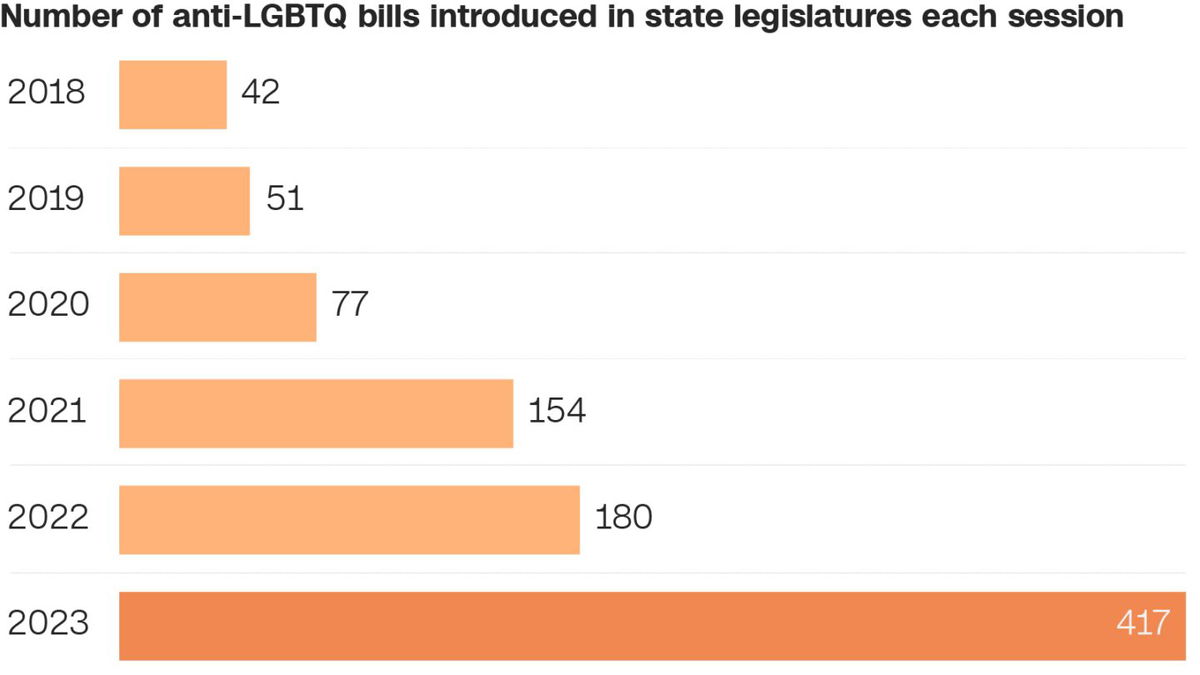Record number of anti-LGBTQ bills have been introduced this year

Legislation targeting LGBTQ rights more than doubled since last year.
By Annette Choi, CNN
At least 417 anti-LGBTQ bills have been introduced in state legislatures across the United States since the start of the year — a new record, according to American Civil Liberties Union data as of April 3. That’s already more than twice the number of such bills introduced all of last year.
Education and health care-related bills, in particular, are flooding in at unprecedented levels. Along with a renewed push to ban access to gender-affirming health care for transgender youth, there has been a heavy focus on regulating curriculum in public schools, including discussions around gender identity and sexuality.
A total of 283 education-related bills have been introduced so far this year — more than twice the number of such bills introduced last year, according to ACLU data as of April 3.
There has also been a shift in focus toward new categories of bills. Just as states followed Florida’s bill that opponents labeled “Don’t Say Gay” — which restricts in-school discussions about sexual orientation or gender identity — several joined Tennessee in proposing bills that would ban drag performances.
New bills are filed nearly every day and the landscape is changing quickly. “A bill that got introduced yesterday is almost old news,” said Kat Carrick, a professor at the George Washington University LGBT Health Policy and Practice Program.
“We have seen the scope and scale of these attacks increase over the last few years, starting around 2020-2021,” said Gillian Branstetter, communications strategist for the ACLU. “This year, it’s not just the total number that has gotten worse, but the extremity of the bills.”
Several states have introduced “forced outing” bills, which would require teachers to alert parents when a student begins going by a different name or pronouns, even without the consent of the student. Sixty of the education-related bills introduced this year are “forced outings” bills, according to ACLU data.
“[These bills] rely on this sort of paranoid idea that teachers are secretly encouraging your kids to identify as trans, and then not telling you about it,” said Branstetter. “It’s fundamentally important that all young people feel they can build trust with the people that they spend most of their day with, which are their teachers.”
The “other school barriers” category in the above chart includes two kinds of bills that would affect students’ preferred pronouns (if they do not correspond to the students’ sex assigned at birth), either by prohibiting teachers from referring to students by their preferred pronouns without parent consent or by allowing teachers to refuse to do so. It also includes “Parents’ Bill of Rights” bills that would require schools to publish curriculum publicly and allow parents to inspect books and reading materials made available in school libraries. Republican supporters argue that greater parental oversight will prevent exposure to “radical” literature and inappropriate discussions around race, gender and sexuality.
Twenty-four of the more than 400 bills introduced this year have been signed into law in 11 states so far. A majority of them are health care and education-related. Two, however, ban drag performances in public spaces.
Drag shows began attracting scrutiny from conservative lawmakers as they began moving into the mainstream over the last decade. At least 39 bills targeting drag performances have been introduced in legislatures this year — a category that didn’t exist in past sessions, according to the ACLU. Several of the bills aim to group venues hosting drag shows with adult movie theaters and strip clubs, while others would prohibit performances from taking place in the presence of children. Republican sponsors say they worry that the performances expose children to sexually provocative and inappropriate themes. Last week, a federal judge paused enforcement of Tennessee’s drag ban hours before it was set to go into effect — in a case brought by a Nashville theatre company against the controversial law.
More than two-thirds of the health care-related bills introduced this year would ban gender-affirming care for trans youth. Ten of those bills have been signed into law so far this year, according to a CNN review of state legislation and ACLU data. That’s more than triple the number of bills passed in 2021 and 2022 combined.
Gender-affirming care is medically necessary, evidence-based care that uses a multidisciplinary approach to help a person transition from their assigned gender — the one the person was designated at birth — to their affirmed gender — the gender by which one wants to be known.
The majority of Americans — 54 percent — oppose bills criminalizing gender transition-related medical care for minors, according to a recent NPR/PBS/Marist poll. Several of the bans passed in previous years are currently held up in court.
In the last couple of weeks, Idaho’s governor signed a bill restricting transgender students from using school bathrooms that align with their gender identities. And Kentucky lawmakers overrode the governor’s veto to pass a sweeping bill that would ban gender-affirming care for trans children.
This new wave of anti-LGBTQ legislation — many directly targeting the nearly 2 million transgender people living in the United States — comes at a time when 1 in 4 transgender adults say they have been physically attacked, according to a Kaiser Family Foundation/Washington Post survey conducted at the end of 2022. The rate is higher for trans people of color.
The-CNN-Wire
™ & © 2023 Cable News Network, Inc., a Warner Bros. Discovery Company. All rights reserved.
CNN’s Devan Cole contributed to this report